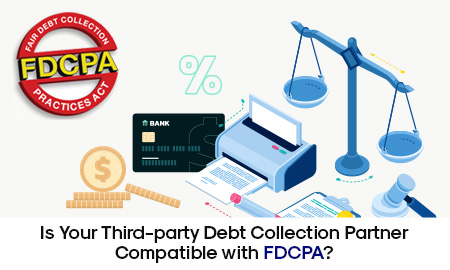Understanding the fundamental difference between first-party and third-party collection services could influence how your company executes business. In addition, what regulations must you follow, and what your customer’s expectations should be throughout the entire account resolution process? But, let us first know what the main differences between these two types of collection services are.
Defining First Party and Third Party Collection:
In the account receivables (AR) industry, collection attempts are made by myriad sources. Portfolios of past-due accounts can be purchased or sold, with many provisions in between. The designation of first-party debt and third-party debt collections was officially cemented based on adopting the Fair Debt Collection Practices Act (FDCPA). The FDCPA guidelines aimed to stem the tide of harassment and over-the-top collection strategies by what the Government of the United States deemed third-party collection agencies. So, what exactly differentiates between the two services?
In the case of credit card debt, vehicle loans, medical expenses, student loans, mortgages, and other household debts, the original creditor is the one making the “first” party collection efforts. Banks and credit card firms come to mind. The initial creditor who gave the consumer the loan is considered the “first” entity qualified to collect on that account.
First-party collection services can be carried out on behalf of the original creditor using their own internal receivables management techniques. Many AR companies operate as the original creditor’s extensions and make efforts to collect on accounts in order to maintain both favorable client experiences and the collection of past-due money.
These first-party collection attempts are typically made earlier in the credit cycle before the accounts are charged-off.
As an illustration, if someone owes $1,500 to Citibank and has missed a payment, a Citibank affiliate will make an effort to recover that money as the “first party.” A service representative, acting in the bank’s name and on behalf of a customer service provider or an outsourced collection agency, will make an effort to collect the money that is owed.
When the account has previously gone through the delinquency (missed or late payments) and default (consistently failing to make payments) stages, third-party collection services typically start after the debt has been charged off (written off as a loss) by the original creditor. After the account is “closed” with the original creditor, they can take several actions to recover losses on that loan, such as using internal or external legal counsel, selling the account for the money, or making more attempts to collect on it.
Because they are made by companies who were not parties to the original contract, collection efforts are referred to as “third-party.” There are three possible ways for third-party collections to start:
- The original creditor continues to be the owner of the charged-off account but assigns the collection task to a third party that will try to recoup the debt in exchange for a contingency fee. In this situation, the third-party debt collector usually only earns money if the debtor pays up or if the agency and the original creditor agree to upfront costs.
- The original creditor transfers ownership of the account to another company. Any attempts at the collection after the account has passed ownership are automatically regarded as third-party collections.
- The primary creditor contracts with a third-party client for litigation services in an effort to recover the debt through verdicts and other legal actions.
In each instance, third-party collection services are considered as such because they are trying to collect on the account on behalf of the actual creditor. This lets the original creditor refocus away from all those charged-off accounts and allows these agencies to collect past dues under various circumstances.
For instance: In the same scenario above, if the account holder misses payments and their $1,500 debt is charged off, Citibank will now either sell their account to a third-party service provider or hand off the account to a debt collection agency XYZ who will make further attempts on their own behalf, not as a Citibank affiliate.
What Differentiates First Party and Third Party Collection:
What regulations the organizations adhere to is the crucial distinction between first- and third-party collection services and collections in general. These widely accepted criteria were made more concrete by the FDCPA laws, which specifically mention third-party collection companies. First-party collection services are exempt from the FDCPA’s strict rules that third-party agencies must abide by.
This is due mainly to the fact that any agreement that the initial creditor and the customer sign typically protects the original creditor. The original creditor is permitted a great deal of discretion over how to internally collect on its loans. The FDCPA intervenes after the debt is given to a third party to make sure that no unfair or predatory collection tactics are used against those who owe money.
The Consumer Financial Protection Bureau (CFPB) seeks to verify that even original creditors are treating their customers fairly, even though the FDCPA doesn’t clearly lay out any rules for them. The CFPB has extensive authority to “prohibit unfair, misleading, or abusive activities or practises,” even if it cannot enforce the FDCPA against original creditors.
A first- and third-party system determines how rules and norms are applied to each company. A third-party organization is subject to strict and unbending rules that guarantee each step of the collection process is secure for consumers. At the same time, the original creditor is given some additional freedoms to collect from individuals to whom they loan money.
Finding the right collection agency:
Suppose your business deals with unpaid invoices and customers who are avoiding your communication efforts. In that case, it might be time to consider a professional debt collection service. Those unpaid invoices are more likely to cost you much more than you actually think.



